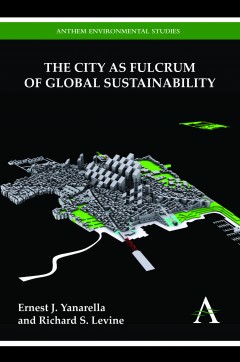The City as Fulcrum of Global Sustainability
By Ernest J. Yanarella & Richard S. Levine
Other Formats Available:
- About This Book
- Reviews
- Author Information
- Series
- Table of Contents
- Links
- Podcasts
About This Book
This book responds to the some of the twenty-first century’s most assuming problems of our times: global warming, sub-national terrorism, natural resource depletion, and economic, environmental and financial crises. It finds short- and long-term solutions to these global woes by looking to the city as the fulcrum for introducing sustainability around the world. Beginning with an outline of a robust strategy of sustainable cities—or sustainable city-regions—that has emerged out of over two-and-a-half decades of theoretical and practical work, the authors show why these portentous problems can best be addressed at the local-regional scale. In the process, this book cuts through the received wisdom and popular misunderstandings about sustainability and peels away the conceptual fog and ideological confusion about the meaning of sustainability.
Drawing upon extensive fieldwork in North America, Europe and Asia, the authors examine both strong and weak examples of sustainable city approaches that validate their distinctive urban sustainability strategy. They discover keen insights and important lessons in these case studies for sustainability practice across the globe, whether in small towns in the US and Canada, large cities in Europe or tiny Chinese villages in Asia. Their concluding chapter argues that only the road less travelled holds real promise of creating sustainable city-regions around the world guided by the toolkit of ecological and technological conviviality.
Reviews
‘An extensive how-to manual for the ultimate think-globally-act-locally mindset and activities that meld our global trajectory toward urbanization with responsible planning for the well-being of our planet and its people. […] I applaud the authors for their creativity and conviction.’ — Bill Ferguson, ‘Sustainability: The Journal of Record’
‘This book is timely, well referenced and comprehensive, presenting the Sustainable Area Budget of a city and its hinterlands as the decision space within which to foster interaction and collaboration in designing an as-yet-untold future.’ —Professor Robert Koester, Director of the Center for Energy Research/Education/Service, Ball State University, Indiana
‘Yanarella and Levine argue that discrete programs of sustainable development – particularly those that target the “low-hanging fruit” – may not lead to ecological or social sustainability, and may in fact simply perpetuate “less unsustainable” development. The alternative they lay out is comprehensive and measurable: a participatory path to sustainable urban development that does not export problems beyond the territory or into the future.’ —Professor Joan Fitzgerald, Northeastern University, Boston
‘It is irrefutable that cities are the glue that holds together any civilization – in fact they often are the civilization. This insightfully clear text demonstrates the necessity of acknowledging this role for the city – the world will depend on it.’ —Pliny Fisk III, Co-director, The Center for Maximum Potential Building Systems
‘This book stands almost alone in the literature on sustainability in correctly proclaiming the role of our built environment – cities, towns and villages – as the lifestyle-defining, energy- and transport-solving, climate-stability-achieving foundation of any structure – physical or strategic – we might hope to build and live in and through. How to get there? Read it and get busy.’ —Richard Register, Founder and President of Ecocity Builders
Author Information
Ernest J. Yanarella is Professor of Political Science and Richard S. Levine is Professor of Architecture at the University of Kentucky. Together, they cofounded the university’s Center for Sustainable Cities (CSC), whose aim is to study and advance the theory and practice of sustainability.
Series
Anthem Environmental Studies
Table of Contents
Preface and Acknowledgments; List of Tables and Figures; Introduction; Part I: Strategic Considerations; 1. Does Sustainable Development Lead to Sustainability?; 2. The Sustainable Cities Manifesto; 3. Variations on a “Green” Theme: Overcoming Semantics in the Sustainability Debate; 4. Don’t Pick the Low-hanging Fruit?; 5. From the City to the City-Region: The Sustainable Area Budget, Rural Partnerland and Sustainability Engine; 6. The Sustainable City Game as a Game and a Tool of Urban Design; Part II: Sustainable Cities Around the World; 7. Urban Dreams of Global Sustainability; 8. The Promise and Pitfalls of Chattanooga’s Entrepreneurial “Sustainability” Strategy; 9. Sustainability Comes to Okotoks, Alberta; 10. Vienna’s Westbahnhof Sustainable Urban Implantation − The City-as-a-Hill; 11. The Success of SUCCESS: The Chinese Village as Catalyst of Future Chinese Sustainable Cities; 12. The Long March to Sustainability in China; Closing Thoughts; Conclusion: Taking the Road Less Traveled; Appendix; Appendix A: Charter of European Cities and Towns Towards Sustainability; Appendix B: Emerald City: A Roleplaying Sustainability Game; References; Index
Links
Stay Updated
Information
Latest Tweets



